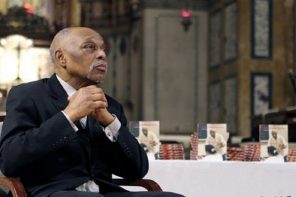Having lived, at one time or another, in fifteen different states during the course of my fifty-four peripatetic years, I confess a special fondness for Iowa. I spent my high school years there, fell madly in love for the first time, and came to appreciate the unsurpassed beauty of its green fields and undulating hills. Sure, there are places more scenic, vistas more spectacular, but nowhere as lovely.
So it was with a blush of pride that I read of the Iowa Supreme Court’s unanimous decision last week that the denial of marriage licenses to same-sex couples violated the equal-protection provisions of the state Constitution. For years now, I’ve asked legal scholars why gay-rights activists weren’t pursuing civil protections by appeals to the Fourteenth Amendment. I’m no expert on the law (not by any means), but it has always seemed to me that the denial of civil rights to gays and lesbians violated the equal-protection provisions of the Fourteenth Amendment. Whenever I raised the issue with those who know more about the law than I (which is to say, almost everyone), I got long, convoluted answers, the gist of which seemed to be that I had no earthly idea what I was talking about.
Now it appears that the Iowa court was thinking along the same lines of equal protection. (I told you I liked Iowa!) To my knowledge, this is the first legal ruling in favor of same-sex marriage that casts the judgment in terms of equal protection under law.
After that initial blush of pride about the ruling, my second response was amusement at the reaction it engendered. Gay rights activists seemed surprised that such a decision came from the heartland of America, flyover country, not from the Northeast or the Left Coast. The author of an op-ed in the New York Times breathlessly declared that he, a gay man, would soon have the right to marry “in ‘conservative’ Iowa.”
The author acknowledged that Iowa had a progressive past; his parents, an interracial couple, had emigrated across the Missouri River from Nebraska to Iowa in order to be married in 1958. But he seems not to have appreciated the full extent of Iowa’s progressivism.
It was to Josiah Bushnell Grinnell, an abolitionist Congregational minister, that Horace Greeley, editor of the New-York Tribune, issued his famous advice, “Go West, young man, go West!” Grinnell heeded that advice and headed to Iowa, where he became active in politics and eventually founded the college that bears his name in the Iowa town that also bears his name. Henry A. Wallace, Franklin Roosevelt’s secretary of agriculture and vice president, hailed from Adair County, Iowa. Wallace was the Progressive Party candidate for president in 1948.
More recently, Tom Harkin has represented Iowa in the United States Senate since 1985. He was best friends with the late Senator Paul Wellstone of Minnesota, and Harkin today is arguably the most liberal member of the Senate. Iowa also has a long tradition of support for public education and for the arts.
All of this is not to say that reactionary elements are not present as well. Iowa’s other senator, Charles Grassley, is certainly a conservative, especially on fiscal matters, but by no means a conservative in the mold of Jesse Helms or Rush Limbaugh.
And now Iowa is part of the vanguard on gay rights and same-sex unions, the first state in the heartland to join that march for equality. No surprise there.




